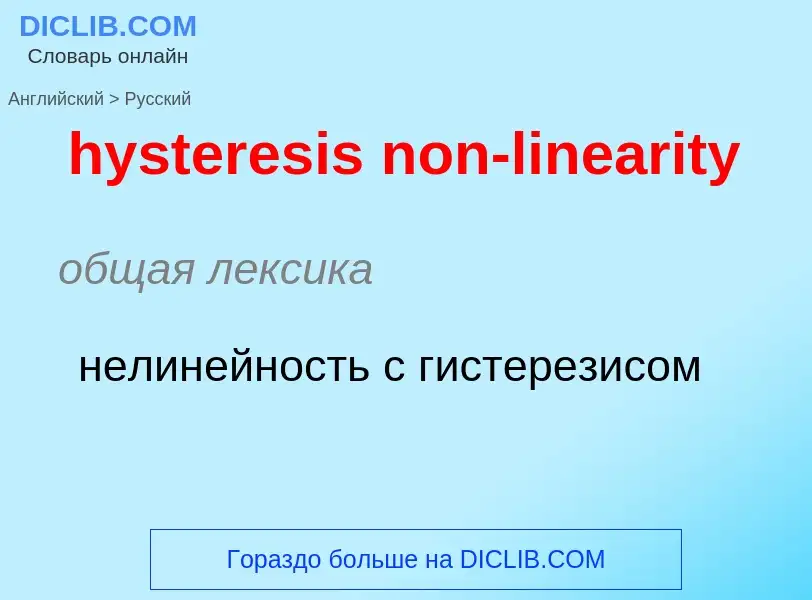Traduzione e analisi delle parole tramite l'intelligenza artificiale ChatGPT
In questa pagina puoi ottenere un'analisi dettagliata di una parola o frase, prodotta utilizzando la migliore tecnologia di intelligenza artificiale fino ad oggi:
- come viene usata la parola
- frequenza di utilizzo
- è usato più spesso nel discorso orale o scritto
- opzioni di traduzione delle parole
- esempi di utilizzo (varie frasi con traduzione)
- etimologia
hysteresis non-linearity - traduzione in russo
общая лексика
нелинейность с гистерезисом
[histə'ri:sis]
общая лексика
гистерезис (отставание в одном из двух связанных между собой процессов или явлений)
гистерезисный
медицина
гистерезис (отсроченное последействие причины)
строительное дело
гистерезис, гистерезисная петля (напр. на диаграмме растяжения)
существительное
физика
гистерезис
запаздывание
гистерезис, запаздывание, отставание фаз
Definizione
Wikipedia
Hysteresis is the dependence of the state of a system on its history. For example, a magnet may have more than one possible magnetic moment in a given magnetic field, depending on how the field changed in the past. Plots of a single component of the moment often form a loop or hysteresis curve, where there are different values of one variable depending on the direction of change of another variable. This history dependence is the basis of memory in a hard disk drive and the remanence that retains a record of the Earth's magnetic field magnitude in the past. Hysteresis occurs in ferromagnetic and ferroelectric materials, as well as in the deformation of rubber bands and shape-memory alloys and many other natural phenomena. In natural systems it is often associated with irreversible thermodynamic change such as phase transitions and with internal friction; and dissipation is a common side effect.
Hysteresis can be found in physics, chemistry, engineering, biology, and economics. It is incorporated in many artificial systems: for example, in thermostats and Schmitt triggers, it prevents unwanted frequent switching.
Hysteresis can be a dynamic lag between an input and an output that disappears if the input is varied more slowly; this is known as rate-dependent hysteresis. However, phenomena such as the magnetic hysteresis loops are mainly rate-independent, which makes a durable memory possible.
Systems with hysteresis are nonlinear, and can be mathematically challenging to model. Some hysteretic models, such as the Preisach model (originally applied to ferromagnetism) and the Bouc–Wen model, attempt to capture general features of hysteresis; and there are also phenomenological models for particular phenomena such as the Jiles–Atherton model for ferromagnetism.
It is difficult to define hysteresis precisely. Isaak D. Mayergoyz wrote "..the very meaning of hysteresis varies from one area to another, from paper to paper and from author to author. As a result, a stringent mathematical definition of hysteresis is needed in order to avoid confusion and ambiguity.".

